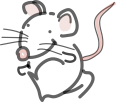–What is the background of the project?
– Our lab will prepare students with essential research skills in both human genetics and mouse genetics. Our lab studies the genetic basis of rare genetic diseases including Alzheimer’s disease (AD), Usher syndrome (USH), Retinitis Pigmentosa (RP), and other forms of rare genetic diseases. We actively collaborate with physicians from the Memory Clinic and the Ophthalmology Department at Tzu Chi General Hospital, Hualien. Patients with a family history of AD, USH, or RP will be recruited to our laboratory. Genomic DNA will be extracted to perform mutational analysis. Patients will first be screened for known candidate genes. If no mutations were found in the known genes, linkage analysis followed by whole exome sequencing (WES) will be performed to identify the disease-causing genes. Functional studies will be performed at the cellular level, tissue level, or at organism level to further understand the molecular mechanisms of the diseases.
What is the aim of the project?
– Our goal would be to understand the molecular mechanisms of the diseases. The short-term aims of the project are to develop genetic diagnostic tools and to understand mutation distribution, and the long-term goals are to understand the molecular mechanisms of the mutation.
What techniques and methods are used?
-The project student will have his or her own project. Depending on the situation, they will be performing the following techniques: PCR, Western blotting, molecular cloning, mutational analysis, Linkage analysis, Human Exome sequencing, sequencing analysis, Mutation detection, Primer design, molecular cloning, cell culture, cell proliferation assay, database search, functional study of the gene, mouse breeding and care, and genotyping.
What is the role of the student?
– The tasks will be done under my supervision. We will have regular meetings to ensure the quality of the study.
What are the tasks expected to be accomplished by the student?
Students are expected to work on their own projects during regular working hours, we also have weekly lab meetings and all lab members are expected to attend. Students need to meet with P.I. to discuss their progress once a week. At the end of the project, students are expected to write up their research in a formal manner using a template provided by the lab and also give an oral presentation to evaluate their performance.
There be any theoretical teaching provided (preliminary readings, lectures, courses, seminars, etc)
What is expected from the student at the end of the research exchange? What will be the general outcome for the student?
– The student will prepare an oral presentation
– The student will prepare a scientific report
– Some students might be able to write a manuscript for the project.
What skills are required of the student? Is there any special knowledge or a certain level of studies needed?
– Students will gain knowledge in human genetics and mouse genetics. We would expect a final presentation and a scientific report. institutional review board (IRB), or by any chance possess any other forms of certification recognized for handling human specimens. If incoming does not possess the certification from IRB, there will also be a 4-hour training prior to the start of the project to aid in the knowledge of handling the samples.
Are there any legal limitations in the student’s involvement?
– No
Hours expected?
9:30 am~5:30 pm; Monday to Friday
What are the type of students the ChingLab accepted?
– Undergraduate/Graduated students
– Medical students
– Pre-Medical students from the American-British system
